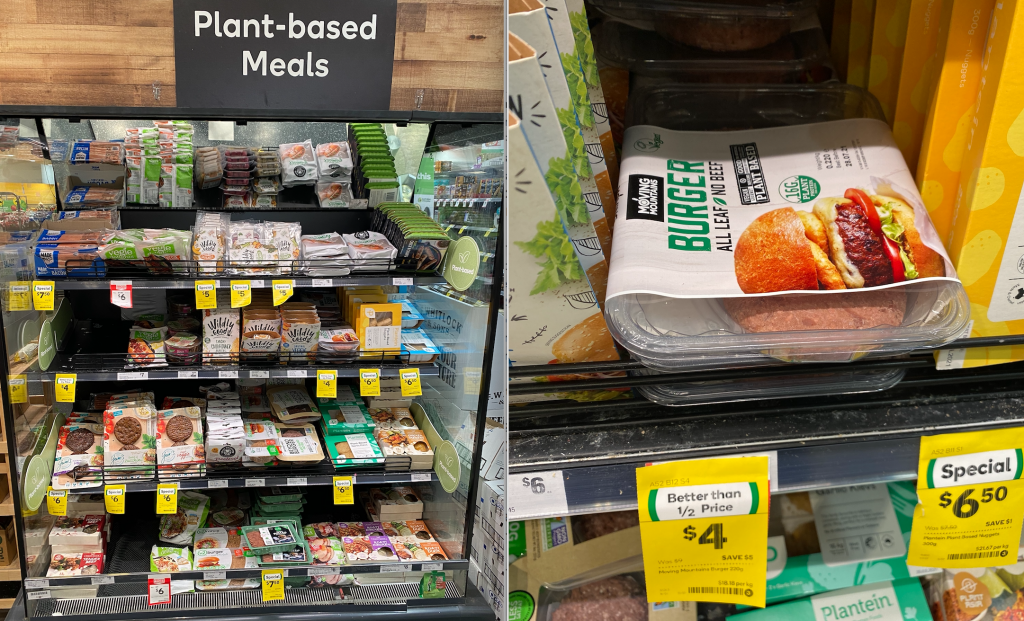
THE alternative meat sector is booming, we’re often told in media reports, backed by data showing spectacular percentage growth (albeit percentage growth from a tiny base), distribution arrangements putting faux meat brands in thousands of burger outlets and supermarkets, and investors climbing on board in multi-million dollar deals.
It all combines to create a compelling picture of a new market category exploding in growth.
But on the critical measure of consumer sales, publicly reported data is much harder to find – which seems to tell a story in itself.
The sheer volume of plant-based alternative meat products now being manufactured and pushed in front of consumers via burger menus or supermarket shelves is creating sales and category growth, if only because consumers are naturally curious to try something new.
But a couple of years after plant based protein alternatives began appearing regularly on menus, the lack of reports showing hard data to demonstrate consumer sales are matching the hype is becoming more conspicuous.
“The novelty is already wearing off” Bloomberg Businessweek wrote last week, noting that the trend” could spell trouble for the makers of the products who’ve hyped the partnerships as a major step to mainstream popularity”:
“The biggest restaurant chains are backing off—or at least slowing down—faux-meat plans after the Covid‑19 pandemic and lockdowns upended dining and eating. Instead of trying new things, Americans have been eating at home or seeking familiar, comforting foods when they do venture out. Orders of plant-based burgers and sandwiches at fast-food restaurants were unchanged for the year ended in June, while beef burger orders climbed 12 percent over the same period, according to market researcher NPD Group Inc.
“Sales of meat substitutes overall at U.S. restaurants fell more than 23pc last year, according to Euromonitor International data. Volumes have rebounded this year but are expected to be only 4.4% above the 2019 level.”
Earlier this year Reuters reported “Wall Street’s plant-based love wilts”, focusing on “a cooling of the US stock market’s taste for plant based meat makers”, in turn spreading doubts among investors.
As was widely reported in July McDonald’s has withdrawn its McVeggie Burger less than two years after launch, citing flagging sales.
Hungry Jack’s plant-based “Rebel Whopper” has not been selling as well as the burger giant hoped, according to the handful of media articles in which founder Jack Cowin has been asked about its performance.
“Sales are down on what had been hoped for,” Mr Cowin told the Australian in May. In an interview with the Australian Financial Review published last week he was still quite circumspect, stating that the Rebel Whopper had been making “steady progress”, but “wouldn’t bring about a transformation of the business just yet”.
A couple of things are clearly noticeable about most of the media coverage reporting that the sector is booming. One, most such reports appear to take the manufacturer’s claims of environmental and health superiority to naturally raised meat at face value and without any evidence of verification beyond their initial media release. Second, the sources they use are almost invariably individuals or corporate entities with close commercial ties to the faux meat sector.
While it seems fair to say that media interest and even investor interest in the sector is indeed booming, the question many media articles about plant based proteins are rarely providing answers on is how actual consumer sales are going.
And from the limited examples we have seen this year, the answer at this point consumer support is not reflecting the media and investment hype.
Growth predictions “highly speculative”
The plant-based meat market has existed in Australia for many years. Pioneers such as Quorn have been manufacturing meat substitutes since 1985.
In a report commissioned by an alternative protein sector “think tank”, Deloitte Access Economics recently estimated the value of the sector at around $150m annually.
In the same report, it predicted it will see spectacular growth to be worth $3 billion annually by 2030.
While that forecast generated a round of positive headlines for plant-based meat alternatives upon its released, not everyone was sold on its validity.
Professor Paul Wood AO from Monash University, a biotechnology professor with extensive experience working across the food protein spectrum both academically and commercially, described the prediction to Beef Central as “highly speculative“.
An “unprecedented” compound annual growth rate (CAGR) of 43 percent per annum for 10 consecutive years would be required to achieve that target, he pointed out.
“It would be interesting to know if any food group has ever had compound annual growth rate of this magnitude in Australia,” he said.

Pictures showing discounting of plant-based protein products in a Brisbane supermarket recently.
While media coverage can create the impression that large percentages of the population are reducing their meat intake, meat sales data and consumption projections tell a different story, as do also key independent surveys.
The most recent Australian national nutrition survey found 6.8 percent avoided meat, dairy, eggs, a level that has been largely unchanged for decades. This data was quoted in a submission to the Senate Inquiry into Meat Category branding from plant-based food processor Sanitarium.
Similar sentiments were echoed in Neilsen Homescan annualised consumer data, showing that, despite the enormous publicity that alternative proteins have received, they account for just 0.3 percent of Australia’s fresh meat volume sales, and 0.4 percent of value sales – more detail here.
The results of the largest ever opinion poll on climate change, conducted by the United Nations Development Program (UNDP) and Oxford University, released earlier this year, also showed that many consumers do not view meat as the environmental problem plant-based protein manufacturers portray it as.
Out of 18 policy suggestions presented to global survey respondents, the least favoured option was switching to a plant-based diet. That option also failed to attract majority support in any country – see details here.
While media coverage of the “alternative meat ecosystem” appears to have been booming, as does investment support for the products marketed as so-called climate solutions, the key measure that ultimately counts, as anyone in the livestock sector has always known, is the consumer dollar.
It is still early days, and the sophisticated marketing forces behind the plant and cell based sector will continue to invest significant resources trying to convince consumers their product is better.
But for now it appears the sector still has a hard row to hoe to satisfy its investment backers that consumer support and sales will match the hype.
